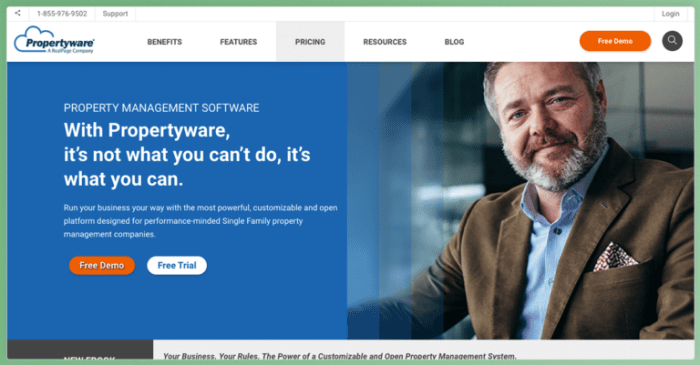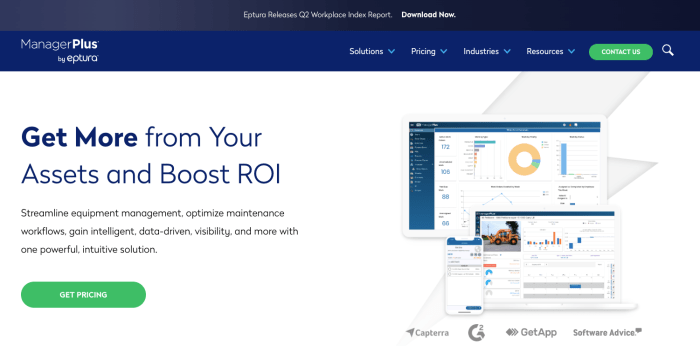Crm software for property management – The property management industry is dynamic, demanding efficiency and seamless communication to thrive. Juggling tenant communication, maintenance requests, lease renewals, and financial tracking can quickly become overwhelming. This is where a robust Customer Relationship Management (CRM) system steps in, offering a centralized platform to manage all aspects of your property portfolio and enhance your overall operational efficiency. This comprehensive guide delves into the world of CRM software specifically designed for property management, exploring its features, benefits, and considerations for choosing the right solution.
Understanding the Need for CRM in Property Management: Crm Software For Property Management
Traditional methods of managing properties often involve scattered spreadsheets, disparate communication channels, and manual processes. This can lead to:
- Missed deadlines: Tracking lease renewals and maintenance requests manually increases the risk of overlooking crucial tasks.
- Poor communication: Lack of centralized communication can lead to misunderstandings and dissatisfied tenants.
- Inefficient workflows: Manual processes consume valuable time and resources that could be allocated to more strategic activities.
- Reduced profitability: Inefficiencies translate to increased operational costs and potentially lower returns on investment.
- Difficulty in scaling: As your property portfolio grows, managing it manually becomes increasingly challenging and unsustainable.
A CRM for property management addresses these challenges by providing a centralized hub for all your property-related data and interactions. This enables streamlined workflows, improved communication, and enhanced operational efficiency, ultimately leading to increased profitability and scalability.
Key Features of Property Management CRM Software
Effective property management CRM software offers a wide range of features designed to streamline various aspects of your business. These features typically include:

Source: buildium.com
Tenant Management:
- Centralized tenant database: Store all tenant information (contact details, lease agreements, payment history, etc.) in one secure location.
- Automated communication: Send automated reminders for rent payments, lease renewals, and other important updates.
- Tenant portal: Provide tenants with a self-service portal to access their account information, submit maintenance requests, and pay rent online.
- Lease management: Track lease terms, renewals, and expirations, ensuring timely action.
Property Management:
- Property inventory management: Maintain a detailed inventory of all your properties, including photos, descriptions, and rental rates.
- Maintenance tracking: Manage maintenance requests, track repairs, and schedule inspections efficiently.
- Document management: Store and access all relevant documents (leases, inspections reports, maintenance records, etc.) securely in one place.
- Financial management: Track income and expenses, generate financial reports, and manage rent payments.
Marketing and Lead Management:, Crm software for property management
- Lead capture and tracking: Capture leads from various sources (website, social media, etc.) and track their progress through the sales funnel.
- Marketing automation: Automate marketing tasks such as email campaigns and social media posts.
- Reporting and analytics: Track key performance indicators (KPIs) to measure the effectiveness of your marketing efforts.
Benefits of Implementing a Property Management CRM
The benefits of adopting a CRM for property management extend beyond simple organization. They contribute significantly to the overall success and growth of your business:
- Improved tenant satisfaction: Faster response times to maintenance requests and clear communication lead to happier tenants.
- Increased operational efficiency: Automation of tasks frees up time for more strategic activities.
- Reduced administrative costs: Streamlined processes reduce the need for manual data entry and paperwork.
- Enhanced profitability: Improved efficiency and reduced costs lead to higher profitability.
- Better decision-making: Data-driven insights from CRM reports help inform strategic decisions.
- Scalability: A CRM system can easily accommodate growth in your property portfolio.
Choosing the Right CRM Software for Your Needs
Selecting the right CRM depends on the size of your business, the number of properties you manage, and your specific requirements. Consider these factors:
- Scalability: Choose a system that can grow with your business.
- Integration: Ensure the CRM integrates with other essential tools you use (accounting software, email marketing platforms, etc.).
- User-friendliness: Opt for a system that is intuitive and easy to use for all team members.
- Cost: Compare pricing plans and features to find a system that fits your budget.
- Customer support: Ensure the vendor provides reliable customer support.
Popular CRM Software Options for Property Management
Several reputable CRM platforms offer solutions tailored for property management. Researching options like Buildium, AppFolio, Rent Manager, and others will provide insights into their respective features and pricing models. Remember to check user reviews and compare functionalities before making a decision.
Frequently Asked Questions (FAQ)
- Q: How much does property management CRM software cost? A: Pricing varies greatly depending on the vendor, features, and number of users. Expect a range from affordable monthly subscriptions to more substantial costs for enterprise-level solutions. It’s crucial to compare pricing models carefully.
- Q: Can a CRM integrate with my existing accounting software? A: Many CRM platforms offer integrations with popular accounting software packages. This is a crucial factor to consider when selecting a system. Check the vendor’s website for compatibility information.
- Q: How long does it take to implement a property management CRM? A: Implementation time depends on the complexity of the system and the size of your property portfolio. Expect a timeframe ranging from a few weeks to several months for larger implementations.
- Q: What kind of training is required to use a property management CRM? A: Most vendors provide training resources, including tutorials, documentation, and sometimes even on-site training. The ease of learning will vary depending on the software’s user interface.
- Q: What are the security features of property management CRM software? A: Reputable vendors prioritize data security with features like data encryption, access controls, and regular security updates. Check the vendor’s security policies before making a decision.
Conclusion
Implementing a CRM system is a strategic investment for any property management business. By streamlining operations, improving communication, and enhancing efficiency, a well-chosen CRM can significantly contribute to increased profitability and sustainable growth. Take the time to research your options, consider your specific needs, and choose a system that will empower your business to reach its full potential.
References
While specific product websites are not directly linked to avoid potential bias and ensure the information remains relevant over time, searching for reviews and comparisons of “property management CRM software” on sites like Capterra, G2, and Software Advice will provide up-to-date information and user feedback on various platforms.
Call to Action
Ready to transform your property management business? Explore the leading CRM solutions available and schedule a demo today to experience the power of streamlined operations and enhanced efficiency!

Source: website-files.com
Commonly Asked Questions
What are the key features of a good property management CRM?
Key features include contact management, lease management, maintenance request tracking, communication tools (email, SMS), reporting and analytics, and integration with other property management software.
How much does property management CRM software cost?
Pricing varies widely depending on the features, number of users, and vendor. Expect to find options ranging from affordable monthly subscriptions to more comprehensive enterprise solutions with higher price tags.
Is CRM software difficult to learn and use?
Most modern CRM systems are designed with user-friendliness in mind. Many offer intuitive interfaces and comprehensive training resources to ease the transition. The learning curve varies depending on the complexity of the software and the user’s technical proficiency.
Can CRM software integrate with my existing accounting software?
Many CRM systems offer integration capabilities with popular accounting software packages. This integration allows for seamless data flow between systems, eliminating manual data entry and reducing the risk of errors.
